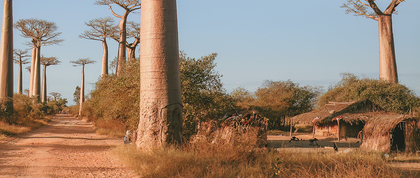
There’s no better time than Public Health Week, with its theme of Protecting, Connecting and Thriving, to share our recent publication on how local, community-based knowledge can enhance public health interventions. It’s a complex topic, but with our co-authors at the Centre Universitaire Régional d'Androy (CURA) in Madagascar, we took a social-ecological approach. Focused on the country’s southern region, our review of research literature revealed that Madagascar’s colonial history has, to this day, a continuing impact on the local and indigenous people and how they face current climate challenges.
Believe it or not, a powerful example of this phenomenon is the prickly pear cactus, which was introduced to Madagascar by French colonialists. Over time, local Malagasy communities used raketa forests as an important source of water and nutrition, and its thorns were a physical barrier against intruders. Eventually, though, the French viewed cactus pastoralism as a “primitive” practice, and eradicated most of the raketa within a decade. This drastic change in the environment resulted in catastrophic starvation events, economic hardship, increasing vulnerability to hunger and high malnutrition-related mortality.
But that’s just one historical example. Today, Madagascar’s southern regions in particular are experiencing more frequent and intense droughts, while being highly dependent on rain-fed agriculture for subsistence and livelihoods. Long periods of minimal rainfall leave communities struggling to produce a stable crop yield and they face famine-like conditions. But existing interventions to mitigate the impacts of such food and climate crises commonly leave out community perspectives and experiences, resulting in strategies that are unsustainable and inequitable.
Our paper holistically discusses the complexity of the climate and food crises due to the impacts of colonial history, politics, economy and culture. We argue that accounting for these contexts illustrates how local knowledge can serve as a protective factor against climate impacts. We also suggest that global aid organizations leverage community-based knowledge in order to develop effective, equitable, and sustainable strategies in the wake of increasingly extreme climate events.
Our research was conducted under the aegis of GPH’s Applied Global Public Health Initiative, which is student-run and service-based. Under the mentorship of GEH faculty Chris Dickey, the Initiative collaborates with outside organizations to find innovative solutions to public health problems. In addition, our report contributes to understanding the role of climate change and its increasing impacts, which is in turn crucial to achieving the UN’s Sustainable Development Goals and meeting its commitment to “Leave No One Behind.”

Liz Carr
MSW/MPH Student, Global Health

Emily Zambiazzi, MPH '23
GPH Alumna, Global Health